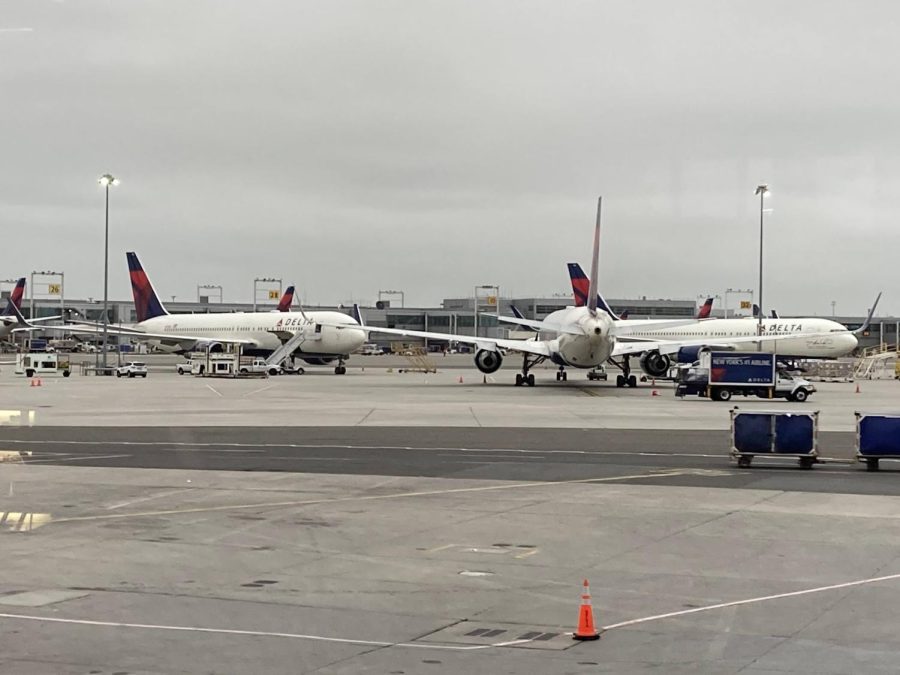Pilot shortage interferes with summer travel, hurts industry rebound efforts
July 3, 2022
The American airline industry is suffering a shortage of pilots, forcing a record number of flight cancellations as the busy summer travel season starts.
The number of working pilots has declined from 84,520 to 81,310 between 2019 and 2021, according to a report by the U.S. Bureau of Labor Statistics. The industry experienced significant losses when the COVID-19 pandemic nearly shut down all travel to curb the spread of the virus.
Domestic airlines hoped for high turnouts when coronavirus vaccines became more accessible, especially during end-of-the-year holidays that involve gatherings. Confidence dropped when the omicron COVID-19 variant threatened another surge in November 2021.
Despite inflation surging ticket prices up 25%, airlines are seeing an increased demand in travel, up from pre-pandemic travel by 25%, according to a report from Mastercard Inc.’s economics institute. This surge is attributed to reducingtravel restrictions and business-related travel returning.
The Transportation Security Administration screened over 2.4 million travelers on June 17, the Friday before Juneteenth. This is up from about 400,000 travelers the same time in 2021 and about 100,000 from May 27, the Friday before Memorial Day.
While this was seemingly positive for airlines, they also faced a surge of cancellations over the weekend, including over 3,200 flights from June 17 and June 18, according to statistics database FlightAware.
“The pilot shortage for the industry is real,” United Airlines Inc. CEO Scott Kirby said during the company’s first quarter earnings call. “Most airlines are simply not going to be able to realize their capacity plans because there simply aren’t enough pilots, at least not for the next five-plus years.”
Since announcing it would cut 100 flights per day in May, Delta Air Lines Inc. voiced optimism over its weekend cancellations dropping by 35%, but the problem persists.
“This phase of our recovery has been the most difficult,” Delta Chief Operating Officer John Laughter said in a press release. “We’ve never had to bring the airline back at this speed before.”
American Airlines Inc. announced that it will terminate service in Islip and Ithaca, New York and Toledo, Ohio on Sept. 7 due to the shortage, according to Fox Business.
To prevent more adverse effects, United announced a $100 million project on June 1 to expand its training facility and allow more potential pilots to be trained and hired. The airline aims to add 2,000 new pilots by the end of 2022 and have 10,000 by 2030.
Kirby announced that the airline also reached a deal regarding its labor contract with its Air Line Pilots Association union.
Meanwhile, in January, Delta said that it would turn its four-year degree requirement for pilots into receiving a recommendation in an effort to increase new hires.
“While we feel as strongly as ever about the importance of education, there are highly qualified candidates – people who we would want to welcome to our Delta family – who have gained more than the equivalent of a college education through years of life and leadership experience,” Delta wrote in a statement.
Some companies like American, JetBlue Airways Corp. and Southwest Airlines Co., offered pilots a wage increase as an incentive, but American faced backlash from its Allied Pilots Association union for coming off as desperate.
“Good on the pilots receiving these raises, but when you have an airline that’s pushing across a more than 50% pay increase, it’s recognizing with dollars that they have a problem,” APA spokesperson Dannis Tajer told CNBC.
American already lost $61 million in its 2021 fourth quarter due to the shortage. Time will tell if any of the airlines’efforts help end the pilot shortage and increase profit, but it may be too soon to tell before the next major travel holiday during the July 4 weekend.








